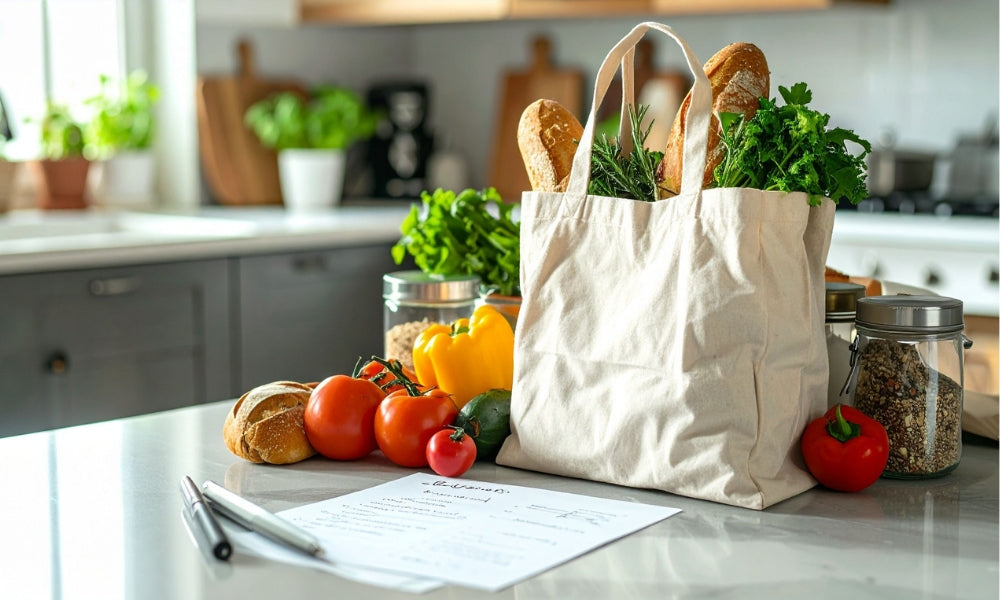
How to keep your grocery shopping bags clean and germ-free
Reusable shopping bags have become part of everyday life in Aotearoa – and that’s a good thing. By choosing to reuse, we’re cutting down on single-use plastic waste, helping our environment, and reducing our carbon footprint. But as with anything that carries food, it's important to keep those bags clean and hygienic.
You may have read headlines lately proclaiming that reusable grocery bags are germ-riddled. But the good news is that it’s easy to form a habit of keeping them clean. If you’ve been tossing your shopping bags in the boot of your car after every grocery shop (and forgetting about them until next time), you’re not alone. But a little care can go a long way in keeping your bags fresh, safe for food, and long-lasting.
Here’s how to make your reusable tote bags work smarter and cleaner for you.
Clean periodically – it’s easier than you think
Reusable bags, like anything that holds food, can collect bacteria, especially from raw meats, dairy or produce. The good news? Most reusable bags are made to handle a wash now and then.
Simple cleaning tricks:
- Cotton or canvas bags: Hand wash or toss them in the washing machine with your regular laundry. Use warm water and mild detergent. Line dry.
- Insulated or laminated bags: Wipe down with hot, soapy water and dry thoroughly with a clean towel. Disinfect with a mix of vinegar and water or a kitchen-safe sanitiser.
- Non-woven or plastic-based bags: These often just need a good wipe-out with a damp cloth and soapy water. Air dry upside down.
- Jute bags: Most jute bags have a fine plastic laminate/lining so they can be wiped out with hot, soapy water and disinfected like any other bag. If you have a jute bag with no lining (which is uncommon) then you’ll need to submerge, and hand wash it, to get it fully clean.
Tip: Make cleaning bags part of your routine – maybe every few grocery trips, or whenever there’s a spill. Or schedule it for the beginning of each month so that you know they’re getting cleaned regularly.
Dedicate bags for specific uses
Cross-contamination is one of the main hygiene concerns when reusing bags. The simple fix? Use different bags for different purposes.
- Meats, fish, and poultry: Dedicate one bag (preferably with a wipeable or food-safe lining) to raw proteins. Label it clearly.
- Fresh produce: Use a clean, dry bag reserved for fruits and veg.
- Pantry and household items: Keep these separate from anything that might leak or spoil.
Storing bags rolled or folded with their use label facing out helps you grab the right one on the go or at checkout. And make sure everyone in your household knows which bag is for what.
Let your bags breathe
Bacteria love warm, damp, dark environments—exactly like the inside of a bag left in your car boot. After use, give bags a shake to remove crumbs or debris and leave them open or hanging somewhere dry until next time. Or even just hang them outside when the sun is shining for a day when you can.
Check for wear and tear
Keep an eye out for rips, fraying, or worn-out linings—especially in bags used for meat or cold items. If a bag is damaged and can’t be cleaned properly, it might be time to retire it (responsibly—many Councils now offer textile recycling options).
Reuseable still trumps single-use!
Let’s not forget: even if reusable bags need the odd rinse or wipe, they’re still far better for Papatūānuku (the Earth) than single-use bags. A cotton or canvas tote reused just 30 times can break even environmentally compared to the energy and waste of single-use plastics.
By making cleaning part of the habit, you get all the benefits of reuse without compromising on food safety or hygiene.
To sum it up:
- Wash or wipe bags regularly
- Dedicate bags for meat, produce, and other items
- Store bags dry and in a clean place
- Keep them in good condition
Reusable bags are a small switch that makes a big difference. With just a little extra care, you can keep your groceries—and your whānau—safe and your footprint light.
Need high-quality reusable bags that are easy to clean and built to last? Check out eco totes designed with both hygiene and sustainability in mind. Kia kaha on your low-waste journey!

